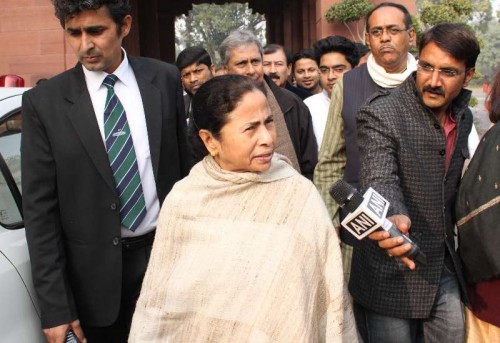
By Anurag Dey
“Don’t loiter around or you will be arrested” – a policeman’s warning, usually used against criminals or anti-social elements, was in fact directed towards journalists. The unusual scene of a policeman threatening to arrest reporters for doing what they do best – hunting for news – actually panned out at West Bengal’s seat of power.
The clampdown on mediapersons at the state secretariat Nabanna, in nearby Howrah, finds its source in a police circular issued earlier in the year that spelled out the “Standard Operating Procedure” of movement within the secretariat, restricting the reporters to the press corner located on the first floor.
While Chief Minister Mamata Banerjee has been virtually at war with a section of media, especially since her government and the ruling Trinamool Congress are under attack over the spreading tentacles of the Saradha scam, her government’s latest salvo has left the journalist community outraged over the attempts to gag the media.
Known for their ubiquitous presence, mediapersons at the 14-storey Nabanna – the seat of government moved to Howrah because of renovation work being carried out at the historic Writers’ Building – are now preferring to stay away from the regular media beats and ministers, unwilling to give an ear to the journalists’ grievances, are going unheard.
Taking strong exception to the clampdown and the arrest threat, the Press Club of Kolkata has dubbed the move as “aimed at stifling the voice” of the fourth estate.
“We condemn the government’s move and demand the state home secretary take immediate steps to restore the freedom of the press. We also demand the intervention of Chief Minister Mamata Banerjee,” said Club secretary Anindya Sengupta.
However, it is not Nabanna alone, the media is unwanted in other places also.
If a battery of lawyers defending state minister Madan Mitra, arrested in the Saradha scam, wanted journalists to be shooed away during court proceedings, the Bidhannagar police have now restricted the entry of journalists to the CGO complex housing the Central Bureau of Investigation (CBI) and Enforcement Directorate offices, citing “instructions from higher-ups”.
Both the agencies are probing the multi-crore rupee Saradha scam and have grilled/arrested a host of Trinamool leaders including its MPs.
While opposition parties and civil society members have slammed the attack on the fourth estate, political analyst Biswanath Chakrabarty finds a sinister motive behind the restrictions at Nabanna.
“More than anything else, the move is aimed at keeping the journalists away from the bureaucrats, many of whom are disenchanted with the high-handedness of the state government.
“The ruling Trinamool Congress is afraid that these disenchanted bureaucrats may leak out crucial information to media, which may be damaging especially with the municipal polls coming,” Chakrabarty, a Rabindra Bharati University professor, told IANS.
Former Supreme Court judge A.K. Ganguly said Trinamool and the government’s attack on the media was reflective of the chief minister’s “fascistic” nature.
“What more can be expected from the government, when the chief minister publicly has been threatening and badmouthing the media. This is yet another reflection of her fascism,” Ganguly, the former head of the state rights panel, told IANS.
However, former Press Council of India Chairman Justice (retd) Markandey Katju refused to find a fault behind the restriction at the Nabanna.
“The state secretariat is a high security zone so the government must have security in mind while passing such an order,” Katju told IANS.
Police have tried to justify the move claiming some reporters “were habitually violating the circular, and going from one floor to another, and even barging into the rooms of officials without prior permission”.
Riled by the opposition to the diktat, the government tried to control the situation by denying arrest threats.
If Home Secretary Basudeb Banerjee blamed the overzealous police, state Urban Development Minister Firhad Hakim insisted nobody made threats of arrest to any journalist.
“No one has spoken of arrest of journalists. Such news is baseless and motivated”, Hakim had said days after a policeman threatened journalists that they would face “serious consequences” including arrests if they move beyond the press corner.